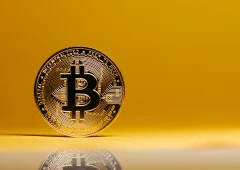Institutional and National Adoption Poise Bitcoin for Historic Growth
22.01.2025 18:30 1 min. read Alexander Zdravkov
Bitcoin's potential to reshape global finance is gaining attention, with analyst Willy Woo suggesting that competition among nations could play a key role in driving its value upward.
Speaking to Natalie Brunell, Woo reflected on how MicroStrategy’s decision to hold Bitcoin in its reserves sparked a wave of corporate interest during the previous market cycle.
He now envisions a different dynamic unfolding—sovereign wealth funds from various nations may follow the example of pioneers like El Salvador and Bhutan, creating a ripple effect that grows with each step.
Woo also pointed to a significant shift in institutional attitudes, highlighting BlackRock CEO Larry Fink’s public support for Bitcoin as a pivotal moment.
He noted that where once asset managers hesitated to endorse Bitcoin due to career risks, they are now not only advocating for it but also entertaining the idea of it becoming a global reserve currency.
This evolution, he suggests, reflects the growing confidence in Bitcoin’s role within the financial landscape.
-
1
Bitcoin: What to Expect After Hitting a New All-time High
10.07.2025 14:00 2 min. read -
2
Peter Brandt Issues Cautious Bitcoin Warning Despite Bullish Positioning
10.07.2025 20:00 2 min. read -
3
Vanguard Now Owns 8% of Michael Saylor’s Strategy, Despite Calling BTC ‘Worthless’
15.07.2025 17:09 2 min. read -
4
Standard Chartered Becomes First Global Bank to Launch Bitcoin and Ethereum Spot Trading
15.07.2025 11:00 1 min. read -
5
What’s The Real Reason Behind Bitcoin’s Surge? Analyst Company Explains
12.07.2025 12:00 2 min. read
Ethereum Spot ETFs Dwarf Bitcoin with $1.85B Inflows: Utility Season in Full Swing
Ethereum is rapidly emerging as the institutional favorite, with new ETF inflow data suggesting a seismic shift in investor focus away from Bitcoin.
Ethereum Flashes Golden Cross Against Bitcoin: Will History Repeat?
Ethereum (ETH) has just triggered a golden cross against Bitcoin (BTC)—a technical pattern that has historically preceded massive altcoin rallies.
Bitcoin Banana Chart Gains Traction as Peter Brandt Revisits Parabolic Trend
Veteran trader Peter Brandt has reignited discussion around Bitcoin’s long-term parabolic trajectory by sharing an updated version of what he now calls the “Bitcoin Banana.”
Global Money Flow Rising: Bitcoin Price Mirrors Every Move
Bitcoin is once again mirroring global liquidity trends—and that could have major implications in the days ahead.
-
1
Bitcoin: What to Expect After Hitting a New All-time High
10.07.2025 14:00 2 min. read -
2
Peter Brandt Issues Cautious Bitcoin Warning Despite Bullish Positioning
10.07.2025 20:00 2 min. read -
3
Vanguard Now Owns 8% of Michael Saylor’s Strategy, Despite Calling BTC ‘Worthless’
15.07.2025 17:09 2 min. read -
4
Standard Chartered Becomes First Global Bank to Launch Bitcoin and Ethereum Spot Trading
15.07.2025 11:00 1 min. read -
5
What’s The Real Reason Behind Bitcoin’s Surge? Analyst Company Explains
12.07.2025 12:00 2 min. read


